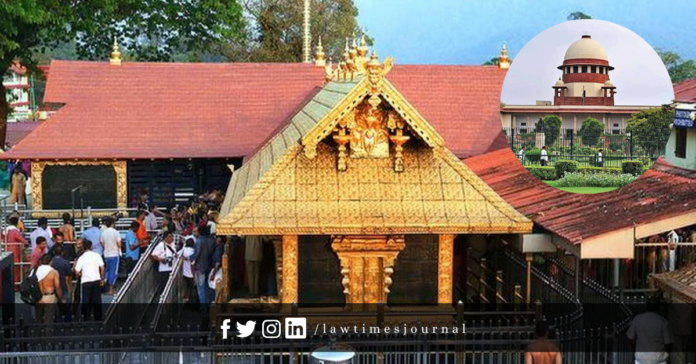
The bench consisting of Chief Justice of India S.A Bobde and Justices R. Bhanumathi, Ashok Bhushan, L. Nageshwar Rao, Mohan N. Shantanagoudar, S. Abdul Nazeer, R. Subhash Reddy, B.R Gavi and Surya Kant gave an order that the court can refer questions of law to a larger bench in a Review Petition after they heard the parties in length. There were issues which were framed for consideration by the Court and they were;
- scope and ambit of the right of freedom of religion under Article 25 of the Constitution of India
- Inter-play between the rights of persons under Article 25 of the Constitution of India and rights of religious denomination under Article 26 of the Constitution of India
- Rights of religious denomination under Article 26 of the Constitution of India are subject to any of the provisions provided in the Part- III of the Constitution of India apart from public order, morality, and health.
- The scope and extent of the word morality under Article 25 and 26 of The Constitution of India and does it meant to include Constitutional morality.
- scope and extent of judicial review concerning religious practice as referred in the Article 25of the Constitution of India
- the meaning of expression “sections of Hindus” occurring in the Article 25(2) (b) of the Constitution of India
- A person not belonging to a religious denomination or a religious group can question the practice of that religious denomination or religious group by filing a PIL
The Court will hear the issue on 17th February 2020.
Appellant, in this case, is Kantaru Rajeevaru and Respondent is the Indian Young Lawyers Association and Ors.
Last year, Then the Chief Justice of India, Ranjan Gogoi had heard the review petition of this case in November. In which he had said on the constitutional validity of practices entailing into the restriction in the entry of women generally in the worship isn’t limited to this case, but also arises due to the debarring Muslim women from the entry in Durgha/Mosque and equally Parsi women married to Non-Pari person isn’t allowed to pray in the holy fireplace of an Agyari. There was another case which required the constitutional courts to tread on questions as to whether a particular practice is essential to religion or integral to religion, concerning female genital mutilation in Dawoodi Bohra Community.
“The Court needs to evolve a judicial policy befitting to its plenary powers to do substantial and complete justice and for the authoritative enunciation of the constitutional principles by larger, not less than seven judges”.
Key-Features:-
- Court will hear the case on 17th February, 2020.
- Women devotees of masturbating age aren’t allowed to worship.
- It is out of respect to the celibate nature of deity in this temple.
- Kerala High Court had legalized the interpretation and forbade the women from entering inside the temple in 1991.
- There is no ritual sanctity or scientific justification for the argument of menstrual pollution says the leftist historian Rajan Gurukkal.
Edited by J. Madonna Jephi
Approved & Published – Sakshi Raje
Reference:-
- Live Law.in, Sabarimala Reference : SC Holds That Questions Of Law Can Be Referred To Larger Bench In Review https://www.livelaw.in/top-stories/sabarimala-reference-sc-holds-that-questions-of-law-can-be-referred-to-larger-bench-in-review-152530
- Live Law.in, Sabarimala Reference: 9-Judge Bench To Consider Tomorrow The Issue Whether Reference To Larger Bench Can Be Made In A Review Petition https://www.livelaw.in/top-stories/sabarimala-reference-9-judge-bench-to-consider-the-issue-whether-reference-to-larger-bench-can-be-made-in-a-review-petition-152338








